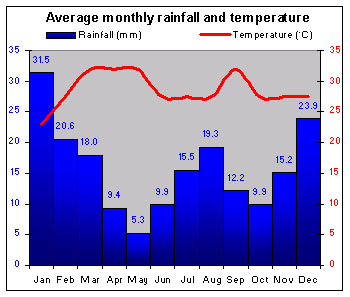COUNTRY INFORMATION |
Introduction |
Nauru, the world's smallest republic, lies in the Pacific Ocean, 4000 km (2480 miles) northeast of Australia. Once a British colony exploited for its phosphates by the UK, Australia, and New Zealand, it became independent in 1968. The phosphates industry made Nauruans among the wealthiest people in the world, but economic mismanagement and the imminent end of phosphate reserves left the country facing financial ruin, prompting economic reform. |
|
Climate |
 |
Nauru's tiny size means that rain clouds often miss the island; years can pass without rain. |
|
People |
| Languages |
Nauruan, Kiribati, Chinese, Tuvaluan, English |
|
| URBAN/RURAL POPULATION DIVIDE |
|
|
|
Indigenous Nauruans are a homogeneous blend of Melanesian, Micronesian, and Polynesian strands. They have traditionally held posts in government service, while a large imported workforce – mainly from Kiribati – mines the phosphates. A society of just over 10,000 people, Nauru is mostly self-regulating. There is some tension between younger Nauruans, who go to Australia to study but have little incentive to do well, and their parents, who fought hard for independence. As the phosphates run out, an increasing feeling of futility is gripping the young. Many see their future in Australia or New Zealand, but fear a drop in living standards and the loss of the luxury of sovereignty. It was these fears which led Nauruans to reject the offer of resettlement on an island off the Queensland coast of Australia. |
|
Economy |
| GNP (US$) |
80
|
M |
GNP World rank |
190
|
|
| Inflation |
-4 |
% |
Unemployment |
No data |
% |
|
StrengthsConsiderable investments overseas. Tax haven. Offshore banking potential. Trust funds for post-phosphate era. Strong Australian dollar. WeaknessesPhosphate revenues due to end in 2003. High cost of rehabilitating the 80% of the island where mining occurred. Virtually no other resources. Bad investment decisions in 1990s. |
|
Politics |
| Lower house |
Last election |
2000 |
Next election |
2003 |
| Upper house |
Last election |
Not applicable |
Next election |
Not applicable |
|
Parliament is based on the British Westminster model, but traditional leaders are the dominant figures. Members of the legislature often switch between temporary groupings based more on personalities than ideologies. Hammer DeRoburt, the island's first post-independence president, dominated the political landscape for two decades until a 1989 vote of no confidence. Since his downfall the presidency (elected by parliament) has changed hands frequently in a more volatile political atmosphere. |
|
Resources |
| Minerals |
Guano (phosphates) |
|
| Oil reserves (barrels) |
No data |
Oil production (barrels/day) |
Not an oil producer |
|
Since 1888 Nauru has been exploited by the Germans, British, Australians, New Zealanders, and recently by Nauruans themselves, for its valuable phosphate reserves. Extraction has destroyed 80% of the island, and the deposits have been virtually exhausted. Nauru has no other resources. The island is entirely dependent on outside energy supplies, and the cost of oil is 50% higher than the Pacific average, since Nauru does not lie on any shipping routes. Most electricity is produced by small diesel generators. |
|
Health |
| Life expectancy |
61 |
Life expect. World rank |
136 |
| Population per doctor |
700 |
Infant mortality (per 1000 births) |
11 |
|
|
|
| Principal causes of death |
Tuberculosis, vitamin deficiencies, diabetes |
|
A diet of processed imported foods and widespread obesity are the major problems. Over one-third of the population suffers from non-insulin-dependent diabetes. Industrial accidents are treated in Australia. |
|
Education |
| Literacy |
99 |
% |
Expend. % GNP |
No data |
%
|
|
| PERCENTAGE OF POPULATION IN FULL TIME EDUCATION |
|
| Primary |
96 |
% |
Secondary |
No data |
% |
Tertiary |
No data |
% |
|
Many Nauruans attend boarding school in Australia from a young age. Few go on to university. |
|
Wealth |
| Cars |
No data |
per 1,000 population |
| Telephones |
185 |
per 1,000 population |
| Televisions |
46 |
per 1,000 population |
|
Nauru is carrying out a major economic adjustment program, to be funded by the ADB. The program is intended to allow it to adjust to the loss of income when its phosphate reserves are exhausted.
|
History |
Colonized by Germany in 1888, from 1919 the island was administered jointly by the UK, Australia, and New Zealand. - 1968 Independence.
- 1970 Gains phosphate control.
- 1992 Australia agrees compensation for phosphate extraction.
|
|